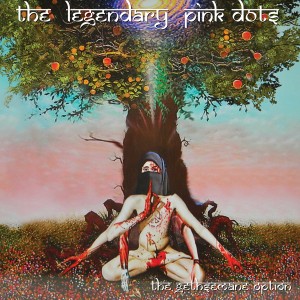“I believe wholly in destiny”
The immortal words of the less immortal Edward Ka-Spel, leader and one of the few survivors of the Legendary Pink Dots; the incredibly difficult to describe but easier to understand now trio from Holland. Though English in thoughts, the Pink Dots have a tendency to speak in tongues, which many people have been either unable to able to comprehend.
Ka-Spel delivers the mass: “The whole idea behind the Pink Dots is the idea of the terminal kaleidoscope. It’s rather like a drowning man seeing his life flash before his eyes. If you look back a hundred years and a hundred years before that, you become aware that things are accelerating at an incredible degree. The whole speed of life is gathering momentum all the time. If you look at that as a process you must reach the conclusion that you’ll eventually reach saturation and overload, thus cataclysm as well. This is the idea of the Terminal Kaleidoscope. We just take the premise that ‘Be glad that you live now. You’re witnessing the most significant time in the history of the planet. Enjoy it. Sing while you may.'”
Not quite a eulogy but close enough. Through the past year, since the release of Any Day Now, their last project as a six piece band in 1988 [Alan’s note: huh? ADN is from 1987!], the LPDs have seen quite a number of near-cataclysms: the sudden departure of half the band, being kicked out of their Amsterdam squat after the city reclaimed the land and then having to live out of a caravan for six months in the country while recording their new album (entitled The Golden Age, due out on PIAS this month) in a farmhouse with poor heating. Yet, underneath it all, Ka-Spel is refreshed, “The whole spirit is positive and driving again.”
He refers to the new abridged lineup for the LPDs, now consisting of himself, other founder Phil Harmonix, and a new saxophonist. Though most of the original members left before the recording of the new album, only violinist and songwriter Patrick Q. remained to record, eventually writing one song, “The Month After.” On vinyl and stage, the LPDs sound tighter. More confined, but in a positive sense. All thoughts are completely agreed upon and there seems to be less conflict in the band. Ka-Spel admits, now living in Nijmegen, Holland, “We have space to breathe because it has always been a rather communistic/democratic band–lovely in principle, horrible in practice. The smallest things would end up having to through a band vote. You just can’t do that and move forward.”
Ka-Spel is the main source for electricity in the LPDs. It’s his enlightened visions of this world and the world that lies beyond the grasp of human touch that enables them to keep hidden. Sometimes almost too hidden. After 11 albums, numerous compilations and cassette releases, the LPDs are still only selling somewhere 10,000 copies of each release. Since their inception in 1980, they’ve continually been set up with unfortunate circumstances and events, culminating with their near breakup last year (their second chance at that in five years — their first being during the recording of their Asylum LP). “I’m realistic enough to know that the LPDs will never be selling millions of records. I think that general growth is fine. It’s a very satisfying way for a band to develop for we can do whatever we like. There are absolutely no pressures whatsoever.”
It could be blamed on his being an only child or the fact that from ages three to ten he underwent psychiatric treatment because they found him to have an IQ around 160 and thus, added some fine doses of phenobarbital to slow him down. “I think it succeeded,” he said once in a letter to me. He dropped out of the local university and played with odd jobs before ending up at a stonehenge festival in mid-summer of 1980. “It was like at three in the morning that these people watching this event throughout the whole night. Nowadays, they’re thrown out of there because it’s a tourist attraction. Back then, they (the Groups) were barely tolerated. That sort of toleration lasted maybe another year.”
With the inspiration sitll in his head, he and accompanying concert-goers Harmonix and friend April Lliff returned to their old victorian squat in London’s East End to practice endlessly for a band that they were to initially call One Day. Ka-Spel remembers: “We actually shared this house with a local rock and roll band who were the local heroes, one of whom happened to be April’s boyfriend. More often these people would pop their heads around the doors and start laughing — “Isn’t it cute? These people are trying to make music!” and walk away laughing still. We never noticed them popping their heads around the door, we just carried on practicing.” Eventually, through various casette networking connections, the LPDs were commissioned to release several tapes on Mirrordot, Chemical Playschool (1980), Klein Kreig (late-81). By 1983, through the help of Rough Trade’s Doug Pearce, the LPDs released Brighter Now, their first album, which only began them on their road to eventual familiarity.
Now in 1989, the LPDs still cling to some of that familiarity, despite the numerous opportunities to change. 11 different musicians have come and gone since their inception, each bringing their own level of continuity to the band. Informally, the LPDs “sound”, so to speak, still retains its mobility. One moment, it reaches the uppermost limits of psychedelia (chaotic, bizarre, moving, flowing), and the next moment it slips far beneath the covers to crawl in utter madness (asylum on a hot summer’s night – young men wrenching in corners of cells tied in jackets and talking to unseen fathers throughout the night about life). It contains but one scent of pure psychadelia: the delightment in evolution, something Ka-Spel doesn’t mind at all, despite the labeling. “I think the term psychadelic is very valid. I mean, it depends on your interpretation of the term. For me, it was the most interesting music that ever existed and that grew from everywhere and it was something that was meant to be expanded not revived. It definitely stopped somewhere at the start of the 70’s. Suddenly, when bands were playing so-called “psychadelic” music again, all they were doing was sort of reviving the earlier form of it in a much poorer way. It’s all about expansion and finding new areas, new lands. That’s what we intend to do. As much as some of the Syd Barrett comparisons that have been made to me, I don’t like the comparisons but I do like what that man did. I think he was great. I would never ever want to put that man down, but really the only comparisons that can be made is that we both have profound English accents and an English style of singing.”
He continues to elaborate: “In my personal life, I like to be optimistic, because being optimistic means staying happy. I don’t want to go around like, ‘Yeah, the end is near’ and things like that.”
Yet the darker side of the LPDs, sometimes confused with pure occult worshipping, is more likely to be found on the surface, or at least, on the edge of it. “I would like people to leave bodies. Not be completely on earth at all. I think it’s sort of what great music can do. Astroprojection and all that. I would like to make the soundtrack to make astroprojection possible.”
Ka-Spel and astroprojection: “I experienced it. Often enough, that is. It’s not something you say ‘Oh, when was it?’ It just happened. It’s not something I’ve ever planned. You’re supposed to do it at will. I cannot do that. Like know that it’s happening and know when it’s finished.
“The first time I did it, it was very shocking because when you realize that you’re doing it, the realization makes you sort of flash straight back into your body and you wake up screaming. The last time I sort of realized I did what you would call a belly-flop in the air and just glided back into my body. There was nothing spectacular. I didn’t go to Mexico or Mars or something like that. I was just like in my room. It’s just such an incredibly interesting experience. You can be anywhere. Our bass player (Jason, who has since left the band) did say that it happened to him on stage, which is really quite interesting for it’s quite easy for it to happen, for you whip to yourself into a trance”
Despite all this, the Pink Dots, as long as things continue in the good lane of things, are planning to finally make it to the States to tour sometime in April. Again, as long as things go as planned.
What happens if some night you have an out-of-body experience and for some reason you can’t get back into your body?
Ka-Spel pauses for a moment and then laughs, “Then there will be no more Pink Dots shows.”



 Thirty-three years in existence, working in and around the peripheries of electronics and psych experimentation it is truly remarkable how a band could make a record as utterly enthralling as this when you realise this is around their fortieth album (there are most probably more). The Legendary Pink Dots still consist of voice-extraordinaire Edward Ka-Spel and Phil Knight – both of whom create under numerous aliases as well – with the addition of Erik Drost on guitar and bass (boy does he tremble the room at one point) and Raymond Steeg’s engineering complexities.
Thirty-three years in existence, working in and around the peripheries of electronics and psych experimentation it is truly remarkable how a band could make a record as utterly enthralling as this when you realise this is around their fortieth album (there are most probably more). The Legendary Pink Dots still consist of voice-extraordinaire Edward Ka-Spel and Phil Knight – both of whom create under numerous aliases as well – with the addition of Erik Drost on guitar and bass (boy does he tremble the room at one point) and Raymond Steeg’s engineering complexities.